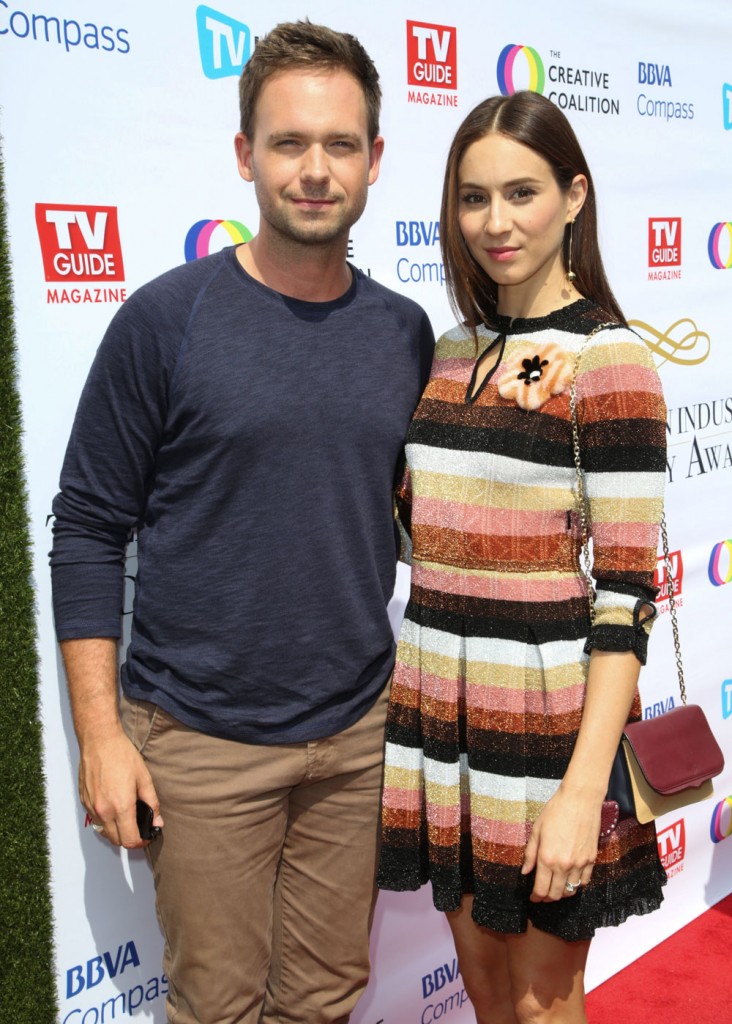Embed from Getty Images
We’ve only covered Troian Bellisario of Pretty Little Liars a handful of times in the past but I’ve been impressed with what I’ve heard from her. She called the makeup on her show misleading in that the actresses look perfect on screen and people have that expectation of her (and other actresses and women) in everyday life as well. She’s also been open and honest about the fact that she suffered from anorexia as a teenager. Given her history of battling an eating disorder, it makes sense that she wants all advertising photos which are retouched to have warning labels on them, particularly ads that show unrealistic body standards. Troian posted this to Instagram, it was a response to a video she regrammed by attn which gave an overview of the fact that France has banned underweight models by BMI. She also wanted to bring attention to this larger issue of doctored photos:
As we all know, most ads and a great majority of social media photos are Photoshopped and/or filtered. If this law were implemented, would they have to disclose exactly how the ad was edited, like “models arms thinned out, thighs smoothed and facial lines erased” or would it just be a small print disclaimer? A general disclaimer would appear on basically every ad and render it meaningless, like the surgeon general’s warning before they started using those photos of diseased organs on cigarette packs. I know, companies could be required to put a link to the unedited photo somewhere in the ad to show what the model/image looked like before. Digitally edited videos where bodies are altered (see any Mariah Carey video from the past few years) should also have a disclaimer and a link for consumers to view some non-edited scenes. I like that idea, but of course I came up with it. France actually did implement this change for photo advertisements. Starting on October 1, images which are digitally altered have to have the disclaimer “photographie retouchée” meaning the picture has been retouched. That’s a good start, but it can go further than that as mentioned.
photos credit: WENN and Getty
















This is a great idea and a great cause. I’ll make a point to watch her.
absolutely like ‘smoking kills” but the like of Kardashicans and Co will always be here to photoshop and mutton will follow..
I think with the Kardashians it should have a disclaimer for enhanced people. Their parts have already been modified i.e. very few people have those bodies normally
and that’s how they sell to teens.. diet pills, corset, lip enhancement (Like, literally It’s my lipstick..$20M..ok like, you know, literally I was so so so insecure because of my ex boyfriend..) and countless lies that kids take at face value…
See, I know some super skinny people who are under the 18 BMI benchmark but are totally healthy.
I understand what Troian is trying to implement here, but maybe we should push the fashion industry to have older, more diverse women with a variety of body sizes.
With the ban, there are still going to be skinny models, that are close to the 18 BMI benchmark.
you clearly didn’t read what she actually had to say, so I’ll repeat it for you:
“I do not agree with all of this. I do not want to BODY SHAME Naturally thin women nor do I want to dictate whether or not they should work based on weight or whether or not they have a mental illness (ED) HOWEVER the thing I love about this is we in America Should have MANDITORY WARNINGS on images in ADvertisements & PRESS that have been doctored.”
so she does Not support the BMI thing but wants photoshop to be labeled. that was the entire point of this article.
here you go.
In addition to what monday said I think eventually, hopefully, young people will read the disclaimers, begin to connect the dots and develop healthier attitudes about body image. Fingers crossed.
I really wish people would READ before providing their opinions … geeze louise
Love Troian. Here in Arg we actually have a law for that. Every photoshopped ad which features people must say “the image of the human figure has been digitally altered”.
LOL said the same thing down below.
Just want to add this is also applied to tv ads, not only print, and for foreign ads too.
Love her – she’s beautiful and always seems so classy.
She is the daughter of Hollywood producers so even more credit to her for using her privilege and experience as a platform. Love her.
We’ve had this law in Argentina for a couple of years. I actually wrote my undergrad thesis on this subject. Every ad on every medium has the “the human form/product has been altered and retouched by software” label stuck on it. I don’t know if it helps any, but it’s there. I believe it’s even added on foreign commercials like for example the Maybelline Mascara with Gigi Hadid. She’s clearly wearing fake lashes even though it’s advertised she obtained that “result” with the mascara.
I don’t understand why this is necessary. We know they’re photoshopped. Young folks are aware of that, especially with Photoshoplike apps being available for them to use for their own social media. Photos of thin people do not cause anorexia. Anorexia is a mental illness. You can’t “catch” it from pictures of thin women. It’s not like a cold. I spent three years of my life in treatment for this shit that nearly killed me and putting a small warning on a photo of a thin woman isn’t going to tell me something that I don’t already know, and certainly isn’t going to help me get better. Veneration of thin models will occur regardless of whether or not they’re photoshopped. Things like this minimize the illness.
I don’t care either way, but let’s not pretend it’s suddenly going to expand into some culture shift.
It would be nice if advertisers chose not to alter ads, e.g. those mascara ads referenced above that do not show what the product does. By making them announce what they have done, others might choose to be authentic and not have the announcement. Change has to start somewhere but that is not a reason not to try.
what we see has a deep impact on our psyche.
We automatically sort ourselves and others based on what we see. If we are oversaturated with images of thin or beautiful, beyond what is ‘normal’ we being to believe that is ‘normal’. It skews your range towards the upper levels incorrectly.
Laymans terms, if you only see tens on tv, you begin to believe tens are close to average.
This works for weight as well, and is partially why we need to discuss the over representation of ‘natural thinness’. How do we discuss the pressures to maintain a low body weight and the harm the current representation does, without a)shaming women with active ED and b)making others feel less than.
With her way of thinking women should stop wearing makeup and fixing their hair. It gives me unrealistic expectations and I makes me feel so ugly running around my house in my sweats and unpolished face.
Come on, get over it! Most people are just average and not beautiful. And that is OK. If you aren’t happy with your looks that is your problem because there will always be someone who looks better than you.
I think the distinction here is that if someone is SELLING something – they should be obligated to disclose if they’ve altered the photo. That actually makes sense, from a truth in advertising standpoint.
I really like her. I wish there was a way to shift young people’s focus from the “glamour” of these fashion/make-up ads to a preoccupation with more fulfilling goals like kindness, empathy, personal accomplishment…
+1 Zondie
Flipside, what about the self-esteem of the women in the photos who maybe had bad skin that day, or something else they didn’t like about themselves in the photo? It wouldn’t just apply to models, it would apply to everyone who has a few blemishes edited out. Even for ads, it would also apply to plus-sized models and to catalogues which invite random women off the street to model (eg Target in Australia). It’s not coming from a good place, it’s coming from wanting to tear women down.
you’re the one suggesting that women are not beautiful if they have a few blemishes or other imperfections, so who’s the one who wants to “tear women down”?
and obviously you Had to point out that it would also apply to plus-size models, because they’re the ones who really need photoshop, right? smh
But that is exactly the culture that we need to work against: that women have to have ‘bad self esteem’ or are not deemed attractive when they have some blemishes or other ‘flaws’. Everyone just editing out anything that’s not ‘fit’ won’t solve the problem and only leads to lower self-esteem and unrealistic standards for everyone seeing the ad.
The intention is to normalize freaking normal!!! human bodies and their characteristics. how is it ‘tearing women down’ when you show them without a photoshopped thin body and airbrushed skin? Maybe you should check the place you’re coming from, seriously.
I met her and her husband in Bali, talked for like an hour.
They’re very intelligent and sensitive people. She looks exactly the same in real life 🙂